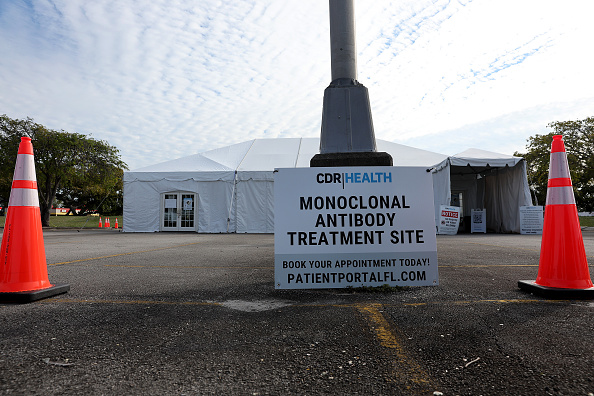An 88-year-old woman on oxygen with advanced-stage chronic obstructive pulmonary disease (COPD) recovered so rapidly and robustly from COVID-19 that within days of being treated with monoclonal antibodies she became the caregiver for her family when they got sick.
“She was running around the house trying to cook and help us,” said Dana Hale, an attorney from Virginia. “I know my story is anecdotal but why wouldn’t we make this antibody treatment more available, so that doctors can use their own discretion to treat their patients.”
Boosted but Sick
Hale and her husband Jim were caring for her mother in their home when one of their adult children came to visit in November after travels where they likely picked up the virus and were still contagious weeks later after mild symptoms.
Hale’s mother was vaccinated and received one booster shot, but within days of the visit rapidly became debilitated with fever and diarrhea.
“We were hopeful because she had the vaccine but she was really, really sick. She was shaking and couldn’t walk,” said Hale.
Navigating Treatment
Hale opted to take her mother to an urgent care center where she was told her mother would be a candidate for the monoclonal antibody treatments because she was within 10 days of the first appearance of symptoms and was not hospitalized. The center told her to call the local hospital to sign up for the outpatient treatment.
“I had to really navigate that myself, calling the hospital, getting rerouted to other people,” said Hale. “Some of the people at the hospital didn’t even know what the treatment was. Eventually, I reached someone who seemed to be the only single point of contact for this, and I managed to get her in the next day.”
The treatment lasted 30 minutes. “Two days later, she made what seemed like an instant recovery. It was amazing,” said Hale.
FDA Pulls Antibody Treatments
Soon after, Hale and her husband got sick with COVID-19, likely the Delta variant, and Hale was hospitalized for five days. Weeks later, both are recovered.
Hale doesn’t understand why the government would ever try to control treatment with the positive results they saw first-hand. However, on January 24, the U.S. Food and Drug Administration (FDA) announced that it was pulling the emergency authorization on two COVID-19 monoclonal antibody treatments, one from Regeneron and one from Eli Lilly, “because data show these treatments are highly unlikely to be active against the Omicron variant, which is circulating at a very high frequency throughout the United States…”
Hale says the nation’s focus should be on treatment and less on shots and masks. “Even if the effectiveness [of monoclonal antibodies] goes down from 80 percent to 20 percent, what other tools do we have?” asked Hale. “Why would we pull it? Why wouldn’t we just make it available? It’s nonsensical to me. It almost sounds to me—and honestly, I’m not a conspiracy theorist—but it sounds like a conspiracy.”
AnneMarie Schieber (amschieber@heartland.org) is the managing editor of Health Care News.
